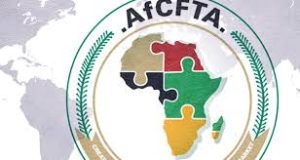 The African Continental Free Trade Agreement (AfCFTA), which officially came into force in January 2021, is creating a significant impact on West Africa’s business landscape. By establishing a single continental market, the AfCFTA aims to remove trade barriers and boost intra-African trade, affecting enterprises ranging from small and medium-sized enterprises (SMEs) to multinational corporations. The agreement covers 54 of the 55 African Union nations, making it the largest free trade area in the world by number of countries.
The African Continental Free Trade Agreement (AfCFTA), which officially came into force in January 2021, is creating a significant impact on West Africa’s business landscape. By establishing a single continental market, the AfCFTA aims to remove trade barriers and boost intra-African trade, affecting enterprises ranging from small and medium-sized enterprises (SMEs) to multinational corporations. The agreement covers 54 of the 55 African Union nations, making it the largest free trade area in the world by number of countries.
Boosting Regional Trade and Economic Integration
For West Africa, the AfCFTA is set to unlock vast economic potential by improving market access across borders. The United Nations Economic Commission for Africa (UNECA) projects that the AfCFTA could boost intra-African trade by up to 52% by 2022. By reducing tariffs on over 90% of goods, it promotes the exchange of goods and services between West African countries, thereby creating more opportunities for local industries to scale across the continent.
Opportunities for Startups and SMEs
Startups and SMEs stand to gain significantly from the AfCFTA. With easier access to larger markets, entrepreneurs in sectors like agriculture, manufacturing, and technology can now export products and services beyond their immediate borders. This is especially impactful in West Africa, where a large proportion of businesses are small or medium-sized. By lowering trade barriers, the AfCFTA allows these companies to tap into new revenue streams across neighboring countries.
However, some challenges persist. Many SMEs in West Africa still face infrastructural issues, such as inadequate transport and logistics, which may hinder their ability to fully capitalize on the free trade agreement. Additionally, navigating the varied regulatory environments across member countries remains a concern for smaller enterprises.
Enhancing Industrialization and Innovation
The AfCFTA also encourages industrialization and innovation in the region by fostering competition and collaboration. Industries such as manufacturing, which have historically been underdeveloped in West Africa, are expected to grow as companies gain access to new markets and become more competitive on a continental level. The agreement incentivizes countries to diversify their economies and focus on value-added industries, rather than relying solely on the export of raw materials.
Challenges to Overcome
While the AfCFTA presents many opportunities, its success largely depends on overcoming significant challenges. According to analysts, infrastructure development will be critical for ensuring the smooth movement of goods across borders. Governments in West Africa will need to invest in better roads, ports, and logistics systems to support increased trade volumes. Additionally, uniformity in trade regulations and reducing non-tariff barriers such as customs delays are essential for the full implementation of the agreement.
In conclusion, the African Continental Free Trade Agreement is expected to reshape the economic landscape of West Africa by creating a more integrated and competitive market. The long-term success of the AfCFTA will depend on how well governments and businesses address existing infrastructural and regulatory challenges.






















